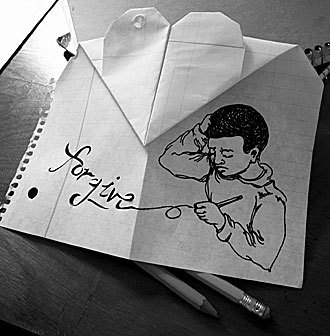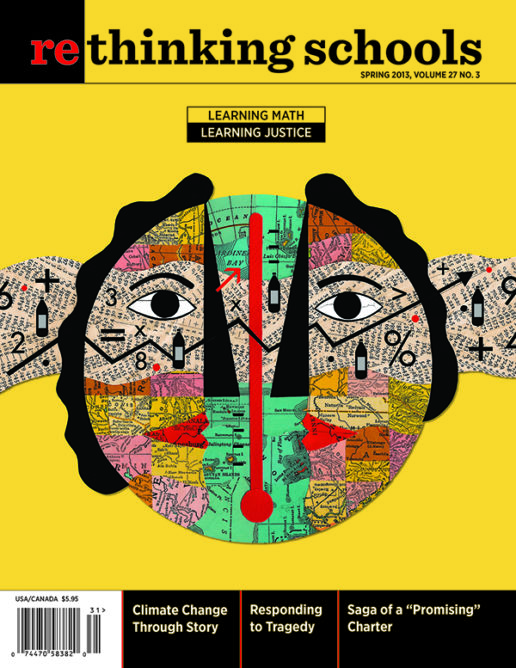“Hey, Mom, I Forgive You”
Teaching the forgiveness poem
Illustrator: Bec Young

I was 13 when my father died. When I was in high school, my mother started dating other men. I resented this for many reasons. Partly, I suppose I wanted her to stay true to the memory of my father, whom I loved madly. But I also missed her; she was absent from my life during that time. My sisters and brother were grown, so our “family” consisted of Mom and me. She no longer cooked dinner. She drank more. She stayed out late. I was lonely and angry and hurt. Many years later, I realized that she was still a “young” woman in her mid-40s. She wasn’t ready to be a widow for life, and there were few eligible prospects in our small town.
Teenagers often harbor resentment as well as love for their parents. Theirs is an age of rebellion and separation. During the last 40 years, I’ve listened as my students stormed in anger at their parents, but I’ve also witnessed their love and loyalty. As a daughter who has forgiven her mother, and as the mother of two daughters who I hope will forgive me all of my mistakes, I find the topic of forgiveness essential—and a recurring theme in literature and history.
As students grow into adulthood, they need to see their parents as people as well as family members. Sometimes understanding the cultural and social pressures that shaped their parents helps them begin to resolve some of the issues that divide them from the significant adults in their lives. For some students the pain is still too close and too fresh to forgive. Both responses are legitimate.
The forgiveness poem is a yearly staple in my classes. I use it when I teach Sherman Alexie’s Smoke Signals in junior English, but it pairs well with many novels or historical periods. In Smoke Signals, Victor, the main character, struggles because his alcoholic father left the reservation, abandoning Victor and his mother. After his father’s death, Victor discovers the reason his father left, as well as his father’s guilt and pain.
At the end of the play, Alexie uses part of a Dick Lourie poem, “Forgiving Our Fathers,” as Victor’s friend Thomas mourns the death of Victor’s father, Arnold, as well as his own:
Do we forgive our fathers for leaving us too often or
forever when we were little?
Maybe for scaring us with unexpected rage
or making us nervous because there seemed
never to be any rage there at allDo we forgive our fathers for marrying
or not marrying our mothers
For divorcing or not divorcing our mothers?
And shall we forgive them for their excesses
of warmth or coldness?
Lourie’s questions float through the class as we read the end of the play, just as Victor’s father’s ashes float on the Spokane River.
Beyond the curricular connections, I use this poetic prompt early in the year because it cracks my classes open. Instead of being cardboard characters—the basketball player, the dancer, the high achiever—students become real people whose veins pump equal parts hope and pain. As one of Bill Bigelow’s and my former students said, “When you hear people’s stories, you can’t hate them anymore.” Writing and sharing our lives builds a community in the classroom that allows students to risk more, to lose their fear of looking or sounding wrong.
We live in a society that is increasingly exploitative and unequal. As jobs fade into perpetual unemployment, the loss of self-worth spins into alcohol, drug, and physical abuse. Families separate and fall apart under the pressure. Too often these issues are not addressed in school, and students take out their anger and grief on each other, creating disruptive and unproductive classrooms. The forgiveness poem gives students space to voice the ways these pressures have played out in their lives.
I begin by reading my poem about my mother to students. Sharing my stories helps build the bond between us. I make myself vulnerable when I’m asking them to be vulnerable.
Dear Mom,
I forgive you for all the nights
you chose men over me,
the nights you stayed out late.
I forgive you for all the evenings
I ate TV dinners,
watching reruns of Maverick
and roamed our lonely house,
only my voice cracking the silence.I forgive you for all the days
when your anger
tumbled out
coating me with curses.I forgive you, Mother,
for I know your heart.
I know your loneliness.
I know the tender ache
that wakes us, alone in the dark
when the foghorn reminds
me that Dad died
and all that is left
is emptiness.
Once I share my poem, we read Lucille Clifton’s poem “forgiving my father.” She berates her father for not giving her mother “what she was due.” Her poem weaves in both understanding and anger:
but you were the son of a needy father,
the father of a needy son; you
gave her all you had
which was nothing.
We discuss the twin emotions that rise up from Clifton’s poem and compare it to how Victor feels about his father.
Then we read two student poems: “Forgiving My Mother,” by Tanya Park, and “Forgiving My Father,” by Justin Morris. (See below.) After reading Tanya’s poem, I ask students, “What do you notice about Tanya’s poem? What’s it about? Can you relate to it?” Students discuss the specific details—pushing her father away, the packing and unpacking. They don’t think that having breakfast for dinner is something to be angry about. Then I push students to notice how the poem is put together. “How did she move her poem forward?” Students note the repeating lines, “For all the times . . . I forgive you.” This is an effective pattern for students.
We follow the same procedure for Justin’s poem. Many students identify with his poem to his absent father. They quickly pick out details—not knowing what his father looks like, not having the same last name, no cards or presents for his birthday or Christmas. Again, I ask them to notice the repetition in Justin’s poem, “I’d like to forgive you, but . . .”
I tell students to take out a sheet of paper and write a list of people they would like to forgive—or not—including themselves. Then to select one of those people and think about specific reasons or events that need forgiving, like Tanya and Justin did. Students write ferociously. Very few get stuck on this assignment. Some use the repeating lines from the students’ models, but others create their own. Most students write to their mother or father. One girl wrote to the man who murdered her cousin, one boy wrote to Hitler, but this is typically a poem between intimates—relatives and close friends.
Let me say that not all of my students have tragic lives, but some do, and this assignment allows them to speak bitterness about it. For others, the assignment lets them lay down some of the resentment they’ve been carrying. One student was placed in foster care after his grandparents were arrested for selling drugs. He wrote:
Hey, Mom, I forgive you
For all the times you didn’t come home
For all the times you left us
At strangers’ houses.For all the times you left us
At our grandparents’ house
For days on end and then forever.Yes, Mom, I forgive you
For all the times you let
Dope come first.For all the times that I found you
Passed out on the couch,
Thinking that you were dead,
I forgive you.For all the times you let me down,
Mom, I forgive you.
Another student is high achieving, but he’s pushed hard by his parents to achieve even more. His poem scorched the pages with his anger at being both yelled at and paraded by his mother:
I’d like to think you’ve learned
From the history textbook of your anger
Or maybe that a teacher would appear to help you learn
And I’d like to think that your atomic bomb
Of rage had broken and wouldn’t explode again.
But wishful thinking won’t change your world.I dream of a morning
When your werewolf screams of fury are nowhere to be heard
When your ceaseless gunfire won’t rip me up
And I dream of a day when you don’t thrust spears through the bars of my
cage of misery then show me off to admiring mothers like a trophy
But dreaming won’t make a better morning.I wish you wouldn’t say, “I love you,”
Like you mean it.
Then tromp on me like I’m dirt
I wish I could forgive you,
But I can’t, and for that I am sorry, Mother.
Absent fathers, like Justin’s, are a common theme in the poems. This poem reflects a familiar refrain:
For all the times you came
In at 2 in the morning yelling
At my mom, I forgive you.For the time you left for
11 years without telling me
I forgive you.
Many students demonstrate the conflict evident in Lucille Clifton’s poem. They are angry, but also curious and willing to stretch out a hand:
If I could forgive you, Father, I would.
But who are you?
I don’t have a clue.
You’ve got my inquiries stuck like a flame to a fuse.
Only you can extinguish them.I never got a hug from Daddy.
You know what? It’s fine.
We share the poems in class during a read-around, where each student shares their piece and others comment. Students are kind and thoughtful. Because of the sometimes painful content, we do not require everyone to share, but most do.
Franz Kafka wrote, “A book should serve as the axe for the frozen sea within us.” For me, the forgiveness poem is that axe. This poem allows the class to address those who have harmed us so that we can move on, hold hands with others who have also been wronged, come to new insights about each other and our lives, understand that we are not alone in our pain. The assignment is not a command to forgive, but an invitation to understand—as Victor comes to understand his father’s alcoholism and disappearance—an invitation to name our hurt and make sense of it.
| Forgiving My Mother | Forgiving My Father |
| For all the times you yelled and all the times you screamed I forgive you. For all the nights we had breakfast for dinner and dinner for breakfast I forgive you. For all the times I felt you pushed my daddy away I forgive you. For all the times we ran away and came back, For all the times we packed and unpacked for all the friends I’ve lost and all the schools I’ve seen, for all the times I was the new kid on the scene, I forgive you. Tanya Park | I’d like to forgive you, Father, but I don’t know your heart. Your face, is it a mirror image of mine? I’d like to forgive you, Father, but I find your absence a fire that your face might be able to extinguish. I’d like to forgive you, Father, but my last name isn’t the same as yours like it’s supposed to be. You rejected me, Dad, but can I sympathize with your ignorance? For all the birthdays you didn’t send me a card, for the Christmases when I’d wake up, and you weren’t sitting by the tree waiting for me I can’t forgive you. What about the summer nights where prospects of you began to fade? Fade like you did 17 years ago. Out of my life. I’d like to forgive you, Father, but I don’t know you. And for that, I hate you. Justin Morris |

